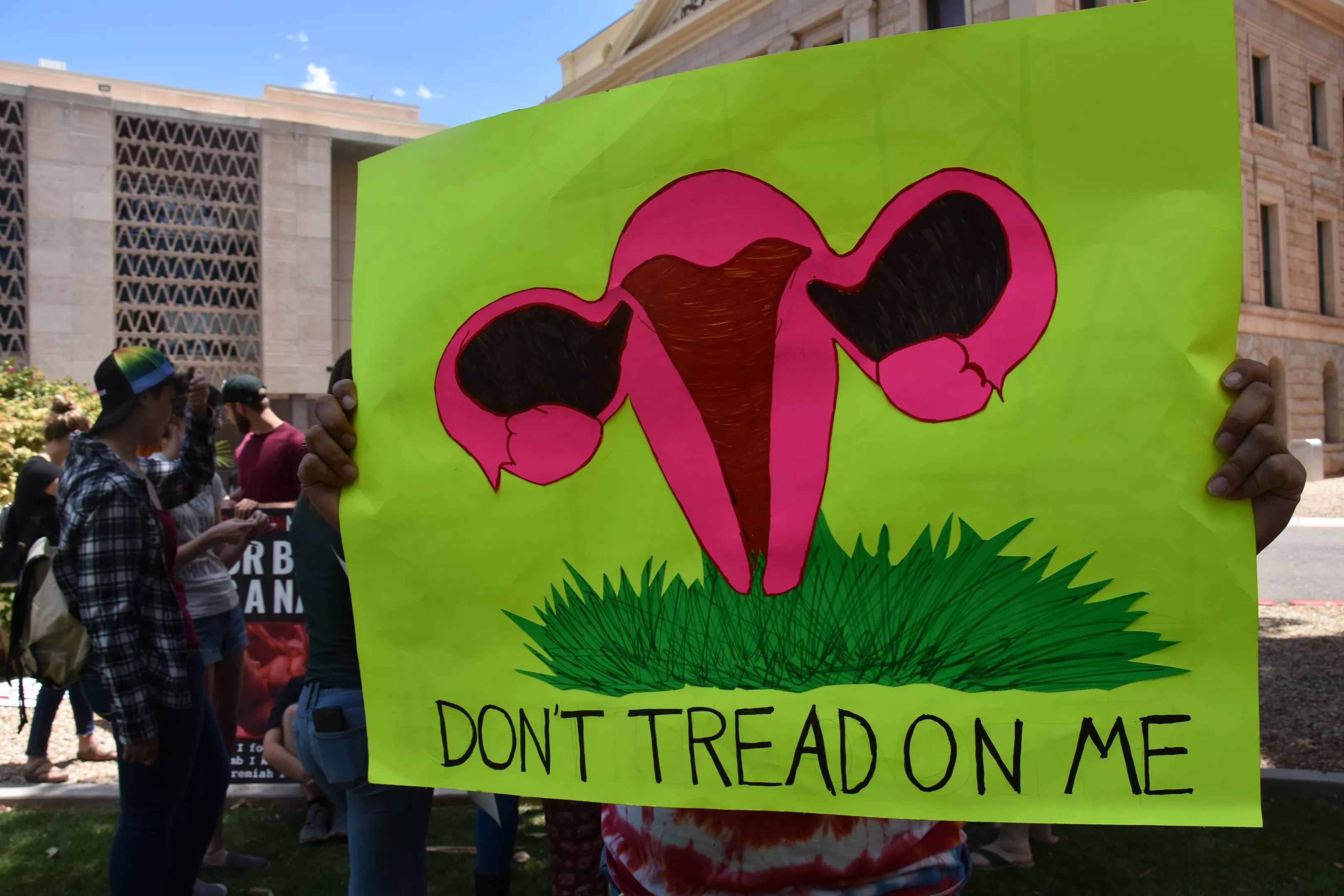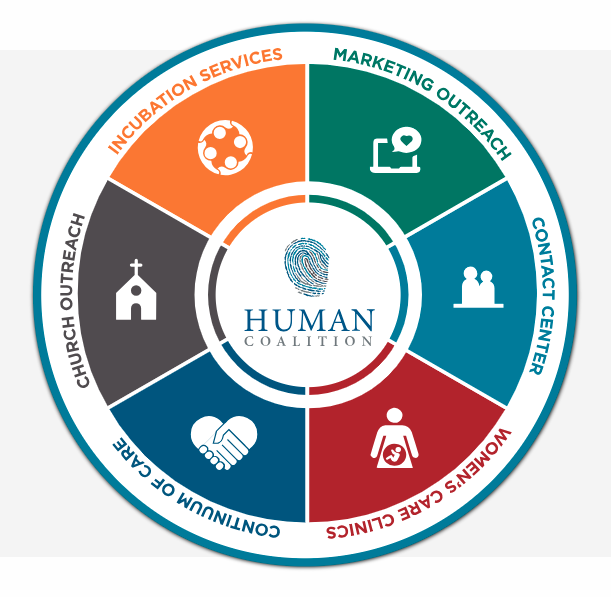
Lynn Trimble

Audio By Carbonatix
Soon after dozens took to the Arizona Capitol on Tuesday to protest newly enacted abortion bans in other states, Republicans in the state House of Representatives introduced a bill to pour $7.5 million in state funding into an anti-abortion group.
The bill, HB 2759, would appropriate $2.5 million annually for the next three years for a “family health pilot program” whose purpose “is to encourage healthy childbirth [and] support childbirth as an alternative to abortion.”
It specifically states that the funding “may not be used for abortion referral services or distributed to entities that promote, refer or perform abortions.” The bill is sponsored by Republican Representative Michelle Udall and co-sponsored by all 30 other Republicans in the House.
Planned Parenthood Advocates of Arizona came out strongly against the bill, as did progressive lawmakers and organizations.
“This is an attempt to deny women and families nonjudgmental care,” Jodi Liggett, executive director of Planned Parenthood Advocates of Arizona, said in a statement Tuesday. It would fund so-called crisis pregnancy centers that provide “biased and often inaccurate and misleading information,” she added.
Crisis pregnancy centers, as they are dubbed, are typically associated with religious organizations with an anti-abortion agenda. They are known for using deceptive tactics and presenting false or incomplete information, with the aim of deterring women from getting abortions.
“Their propagation of misinformation should be regarded as an ethical violation that undermines women’s health,” an article in the American Medical Association’s Journal of Ethics said last year.
In a tweet Tuesday night, Democratic Representative Athena Salman said the bill was “attacking reproductive freedom.” It would fund a Texas-based nonprofit called Human Coalition, she added, that “LIES to and SHAMES women.”
The day we have the rally to #StopTheBans and protect abortion rights, *every House Republican* sponsored a bill attacking reproductive freedom (#HB2759). $2.5m to a nonprofit (Human Coalition) that LIES to and SHAMES women.
Now we know where they stand. #AZLeg pic.twitter.com/xeGv9ercKk
— Rep. Athena Salman (@AthenaSalman) May 22, 2019
The sole purpose of the Texas-based Human Coalition, to which lawmakers were told the $7.5 million would be directed, is to prevent women from having abortions.
On its website, it claims to “[operate] six ‘lab-driven’ divisions in key abortion-dense cities” and to “[serve] and [support] over 45 pro-life pregnancy centers across the country with our marketing and contact center services.”
Human Coalition owns and operates “a new type of life-affirming center called a women’s care clinic,” its website adds. “This expanding network of clinics is specifically tailored to the abortion-determined client and their families.”
It’s not clear what kind of presence or footprint Human Coalition has right now in Arizona, aside from an advocate in Cathi Herrod, executive director of the far-right Center for Arizona Policy, which is backing the bill.
The center’s history is one of railing against LGBTQ rights and pushing dozens of anti-abortion bills at the Legislature.
In an interview with Phoenix New Times, Herrod avoided saying that the money would go to Human Coalition.
“The money would be allocated through a grant-making process,” she said. “It could go to the Human Coalition; it could go to other groups.”
Herrod said she didn’t have a list of other eligible groups, but said that the requirements of the bill were “modeled after a successful program in Texas.” The group would need to have a “sophisticated marketing program” because “it does require some expertise in knowing how to market and reach women and offer them their services,” she said.
In Arizona, it is already hard enough for women who want or need an abortion to get one, said Tayler Tucker, spokesperson for Planned Parenthood Advocates of Arizona.
Eighty percent of Arizona counties have no abortion provider, Tucker said, and access is especially limited in rural parts of the state.
“If you are anywhere outside of Maricopa County … you’re looking at a very difficult network to navigate because there’s only one provider to go to,” she said. In northern Arizona, for example, women have access to one abortion provider – Planned Parenthood – and it offers only abortion through medication.
If women need a medical or surgical abortion, they have to travel to the Phoenix area or to other states, Tucker added.
Now, she said, HB 2759 was attempting to take funds that could be used for “a whole slew of social programs” and putting it toward extremist organizations that sought to misinform people seeking reproductive health care.

The sole purpose of the Texas-based Human Coalition is to prevent women from having abortions.
HumanCoalition.org
Over the last decade, lawmakers in Arizona have sought to chip away at women’s access to abortion in the state.
In April 2012, then-Governor Jan Brewer signed into law a ban on most abortions after 20 weeks. A three-judge panel of the U.S. Ninth Circuit Court of Appeals subsequently deemed it unconstitutional, but the law is still on the books.
Other laws mandate that only physicians, not nurse practitioners and other medical providers, can carry out abortions, and that women have to wait at least 24 hours between seeking an abortion – which entails a state-mandated counseling from the state-mandated physician – and the procedure itself. Abortions are also forbidden via telemedicine.
In April, Planned Parenthood filed suit against the state, claiming that those laws make it impossible or nearly impossible for women to access the care they need.
At the beginning of this year, a new law took effect that requires abortion providers to gather far more detailed medical information than previously required and to submit that information to the state.
Providers now have to ask women whether or not their abortion is elective, and if not, what medical or other issue prompted it. They have to give the state detailed information about any medical complications that result from the abortion, such as infections, damages to the patient’s uterus, or serious blood loss, and they have to tell the state how many abortions they carried out.
All of that new information goes into the Department of Health Services’ annual report on abortions in the state. The new law also requires that report to include the number of abortions partially or fully paid for by the state, and the total cost to the state.